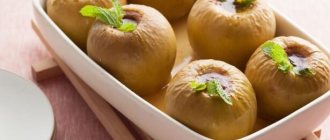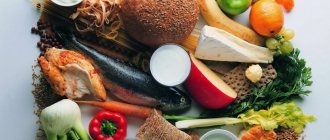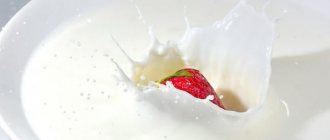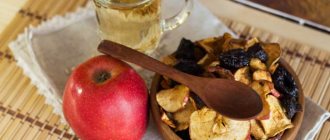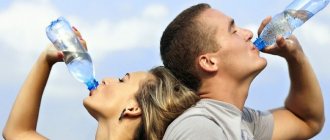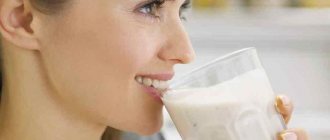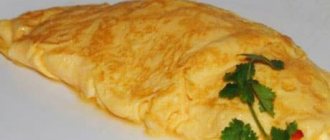Diet of a nursing mother
The first week is the most important for mother and baby - the child is still adapting to independent life outside the mother’s womb. During this week, a nursing mother should reduce, or better yet completely eliminate, the consumption of milk, which does not help, as is commonly believed, to increase lactation. It has been established that milk provokes gastrointestinal dysfunction in mother and child, and can also provoke allergic reactions in the baby. It is not recommended to drink juices and fruit drinks, strong tea and coffee, or eat nuts in the first week.
After the first week, the diet is expanded while maintaining reasonable caution in consuming foods with a high allergenic potential. The nutrition of a nursing mother is not regulated by month, but the main burden on a nursing woman falls on the first six months of the baby’s life. Up to 4-6 months, breast milk is the main and often the only nutrition for the child.
A woman needs about 500 additional kilocalories to the daily diet that she consumed before giving birth (usually 1800-2200 kcal per day), that is, the nutritional value of the daily diet should vary between 2300 - 2700 kilocalories.
The diet should be varied, balanced and, if possible, exclude and certainly minimize foods with a high allergenic potential - nuts, strong broths, tea and coffee. It is recommended to reduce the consumption of foods that cause gas, such as peas and beans.
You should ensure that meat, eggs, milk, and fish are thoroughly thermally processed; you should not eat sushi and raw eggs during breastfeeding. It is necessary to drink enough water. However, you should observe moderation in everything, watch your urination and do not drink a lot of water at night. It is worth limiting your consumption of sugar, salt and spices.
And once again about milk - in later stages of breastfeeding it is better to replace it with fermented milk products, which are more acceptable for the child’s digestion.
It is very important and these are not empty words! Avoid stress and try to maintain reasonable physical activity.
WHO defines the following diet as a balanced and nutritious diet:
- Fresh or frozen red meat (beef, veal, lamb, etc.) – at least 2 times a week;
- Fresh or frozen fish – twice a week;
- Daily consumption of dairy and fermented milk products;
- Eggs - at least 2 times a week;
- Poultry meat – at least 2-3 times a week;
- At least 5 types of fruits and vegetables daily;
- Butter and vegetable oil - daily;
- The volume of carbohydrate (bread, pastries, pasta, potatoes, etc.) food is no more than half of the total daily diet.
Diet of a nursing mother
Choose natural products without preservatives, artificial additives, dyes and nitrates. At the same time, your menu should be varied. It is better to eat frequently (about five to six times a day), 30-40 minutes before feeding. If the doctor has not given you any special recommendations on diet, then your diet must include lean meats, fish, eggs, dairy products, fruits and vegetables, and grains. Among confectionery products, marshmallows, marshmallows and cracker-type cookies are allowed in small quantities.
Vegetables and fruits are a source of vitamins, minerals and microelements. Their assortment depends on the time of year. In summer and autumn, the diet of a nursing mother includes:
- Vegetables: cauliflower, Brussels sprouts, zucchini, eggplant, pumpkin, green salad;
- Fruits: peaches, apples, pears, pomegranates, a small amount of watermelons and melons;
- Berries: cherries, cherries, raspberries, black and red currants, gooseberries, chokeberries, blueberries.
In the winter-spring period, in the absence of fresh fruits and berries, you can eat dried fruits and various home-made canned goods: marmalade, jams, compotes, juices.
To create a menu containing all the nutrients a nursing mother needs, you can use the table as a guide.
Vitamins for nursing mothers
It has been established that the content of vitamins and minerals in the body of a breastfeeding mother is 20-30%, and for some components 50-60% lower than normal. Talk to your doctor about choosing a good vitamin/mineral supplement and specialized foods for your breastfeeding period.
Requirements for vitamins and minerals for women during breastfeeding*
| Indicators per day | Nursing |
| Vitamins | |
| Vitamin C, mg | 120 |
| Vitamin B1, mg | 1,8 |
| Vitamin B2, mg | 2,1 |
| Vitamin B6, mg | 2,5 |
| Nicotinic acid, mg | 23 |
| Vitamin B12, mcg | 3,5 |
| Folic acid, mcg | 500 |
| Vitamin A, mcg, ret. eq. | 1300 |
| Pantothenic acid, mg | 7 |
| Vitamin E, mg current. eq | 19 |
| Vitamin D, mcg | 12,5 |
| Minerals | |
| Calcium, mg | 1400 |
| Phosphorus, mg | 1000 |
| Magnesium, mg | 450 |
| Iron, mg | 18 |
| Zinc, mg | 15 |
| Iodine, mcg | 290 |
| Copper, mg | 1,4 |
| Manganese, mg | 2,8 |
| Selenium, mg | 65 |
*Pocket recommendations on pediatrics, edited by MD, Prof. T.N. Zakharova, 2019
If a woman has bad habits (smoking, alcohol), then she is definitely recommended to take vitamins.
It is very interesting that modern evidence-based medicine has not found confirmation of some of the advice of our grandmothers and mothers, namely:
- Drinking a lot of milk to increase lactation - a direct relationship between the amount of breast milk and the volume of milk consumed has not been confirmed.
- Eating for two - for yourself and for the baby. In fact, nature is so wise that it adjusts the nutritional value of breast milk to the needs of each woman's child.
Proper nutrition for a nursing mother
Holidays are an occasion for feasting. What should a nursing mother remember during the holidays?
- It’s better not to try a completely new product or a dish made from it.
- No more than one glass of dry wine per holiday; drink plenty of plain water at the holiday table.
- Don't forget to pump on time.
- If the child does not have colic, then everything is possible, or almost everything, if you are familiar with all the products.
- If a child suffers from colic, we advise you to exclude sour cream, mayonnaise, spicy, pickled, fatty foods, grapes, and sweet carbonated drinks.
- If your baby is prone to rashes, exclude tropical fruits, strawberries, raspberries, red caviar, fish, seafood, and smoked meats.
Share on social media networks
Nutrition and drinking regime of a nursing mother
and drinking regime of a nursing mother
March 31, 2014
Nutrition and drinking regime of a nursing mother
An important condition for maintaining full lactation throughout the entire period of breastfeeding is proper nutrition for the nursing mother.
The body needs a lot of strength to produce enough milk with high nutritional value for the baby. Therefore, the menu of a nursing woman should be varied and healthy. You must receive all the necessary vitamins, microelements and nutrients not only for the proper growth and development of the baby, but also for your own well-being. It is better for a nursing mother to eat 5-6 times a day, about 30 minutes before feeding the baby (the baby’s milk will come just in time).
If a nursing mother’s diet lacks any healthy product, this can even lead to vitamin deficiency in her and her child. Therefore, the menu of a nursing mother should not be monotonous. It is not recommended to follow mono-diets (diets that involve eating only one product) during breastfeeding, even for a short period of time. This can lead to a decrease in proteins, fats, carbohydrates and vitamins in a woman’s body and in her breast milk, respectively. You shouldn't overeat either. Eat only freshly prepared food. Before meals, you can drink a glass of milk, tea, juice or any other drink to increase lactation. It is more convenient and healthier to eat in a calm environment, when the child is sleeping, so the food is better absorbed.
One of the basic principles of nutrition for a nursing mother is the gradual introduction into the diet of foods that, on the one hand, are required by the body, and on the other, can cause trouble for the baby. This principle especially applies to the nutrition of a nursing mother who has a child under 3-4 months, during the period of infant colic and other intestinal disorders in the baby. To begin with, mother should adhere to a more strict diet - porridge, vegetable soups, potatoes, boiled meat, weak tea. After a few days, you can gradually introduce one new product at a time (from 50 to 100 g). If no negative reaction occurs within 24 hours, the daily dose can be increased.
For cooking, it is recommended to use gentle cooking methods: boiling, stewing, baking.
Approximate daily diet for a nursing mother:
- 500 ml milk and fermented milk products;
- 150-220 g of meat, poultry or fish;
- 20-30 g cheese;
- 100-150 g of cottage cheese;
- 1 chicken egg (60-70% of protein requirements are met by animal proteins);
- 15-20 g butter;
- 25-30 g vegetable oil;
- 200 - 300 g of fruit;
- 500 - 600 g vegetables;
- various cereals.
A nursing mother should consume enough fluid to ensure normal lactation. It has been proven by experience that if you drink at least a glass of plain drinking water 20 minutes before feeding, then milk will come in greater quantities during feeding. The volume of liquid should be from 1.5 to 2 liters per day, including liquid meals (soup, tea, milk, kefir, juices, compotes, fruit drinks without sugar).
Ideally, a woman's main drink during lactation should be regular drinking water.
Limit the amount of foods that can cause fermentation processes in the intestines: grapes, sugar, all kinds of confectionery and sweets. You can, for example, eat one marshmallow without chocolate or marshmallows once a day, but no more.
Limit chicken eggs and chicken. At the same time, baking containing eggs is possible if the child is allergic to this product - with prolonged temperature treatment, the protein is completely destroyed.
Remember that rice, cottage cheese and pear strengthen the child, while fresh and boiled beets, prunes, and blueberries, on the contrary, weaken the child.
Avoid canned food, marinades, salty, smoked and fatty foods, as well as mayonnaise, soy sauce and tomato ketchup.
Avoid dishes with a lot of spices and herbs that irritate the intestines, limit onions, horseradish and garlic (they change the taste of milk, and the baby may refuse to breastfeed), parsley and caraway seeds improve the taste of breast milk.
Avoid allergenic red and orange vegetables, as well as vegetables that promote fermentation processes, gas formation and colic. In the menu of a nursing woman there is no place for white cabbage (especially sauerkraut), cucumbers, radishes, radishes, tomatoes, peppers, and beans. Among vegetables, it is recommended to eat cauliflower, broccoli, pumpkin, zucchini, and squash.
Avoid lard, fatty meats and fish (these products contain large amounts of so-called saturated fatty acids, which are harmful to health and difficult to digest in the gastrointestinal tract).
If a child is allergic to cow's milk proteins, then in addition to dairy products, it is necessary to exclude beef and veal.
Strong allergens that nursing mothers should avoid in their diet are: nuts, honey, citrus fruits, strawberries, raspberries, chocolate, seafood (squid, octopus, mussels, scallops, crabs, crayfish, shrimp, red fish).
Avoid fresh white bread (stuffs due to sugar and yeast content) and fresh black bread (stuffs due to yeast and fiber content).
Avoid all products that contain flavorings, preservatives and artificial colors.
The consumption of alcoholic beverages, including beer, is strictly prohibited, since alcohol passes into breast milk very quickly and can negatively affect the baby’s health.
So, the diet during breastfeeding must be varied and must include all the main food groups to meet the needs of both the mother’s body and the baby.
Dear nursing mothers, feed your babies with the most valuable elixir,
created by Nature itself, and be healthy!
News September 24, 2021 Poliomyelitis and its prevention
September 24, 2021 Allergies in children: signs, causes, treatment
September 24, 2021 Listen to a child’s heart
News archive

